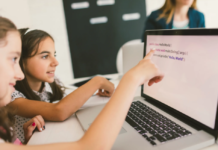Children are no longer mandated to learning lessons from textbooks. Surrounded by gadgets as they are, their education begins earlier than it used to be before. Educationists have realized it’s best to put these new age tools to right use — for education — as practical knowledge has always proven to be more useful than theory.
This holistic education involves a lot of engaging medium which makes learning interesting. For example, use of Virtual Reality in classrooms enables the children to know the subject with a feeling that will stay with them.
“It’s amazing to take the child to the solar system and teach rather than look at a picture in a book,” says Srishti from Impactall Solutions, a start-up in Noida that is engaged in converting textbooks into Virtual Reality study material.
There are coaching institutes such as BYJU’s and Khan Academy that has come up with digital learning apps for the convenience of students.
On the other hand, there are several start-ups and companies that are changing the face of classroom education in India.
Smart classrooms are here to stay. Not only private schools, but government establishments have also opened up to new age learning, joining hands with the corporate sector.
As many as 652 Jawahar Navodaya Vidyalayas across the country, 28 government schools in Tamil Nadu and three Delhi Police Public Schools have Smart Classes set up by Samsung India, covering over 2.5 lakh students. As part of the programme, over 8,000 teachers have been trained in how to use interactive technology.
At several educational institutions, interactive projectors are a big draw as they are making interactive learning more fun.
Satyanarayana P, Director- Visual Products, at Epson, says teaching can be made more interesting for students by adapting to digital learning.
“For the education segment, we have different models, interactive and non-interactive. Both these products can be positioned for the education segment… The advantage of having Epson projectors is that schools do not have to again invest in interactive whiteboards or blackboard. The surface where the image from the projector has been placed can be converted into an interactive panel. And thus, the schools don’t have to invest on interactive panels either,” he adds.
Schools such as National Public School in Bangalore; Sabhagiri International School in Trivandrum; and John Cathedral High School in Mumbai are using these Epson projectors in their classrooms.
“Teaching could be made more interesting for students…by adapting to digital learning in school using interactive projectors. You can also make students try various permutations and combinations. All the material can be stored back again in the laptops for future discussions and verifications,” says Satyanarayana P.
Epson has also tied up with ICTRC (Institute of Counsellor Training Research and Consultancy), a nodal agency appointed by the government to conduct regular programmes for school principals across India, looking at bringing about a change in the education system.
“We are trying to educate school management, teachers as well as students. We have also tied up with ICTRC, the government’s nodal agency which conducts regular school programmes for principals across India. Apart from taking regular feedbacks from agencies, we try to give information to the school principals about available Epson products that could help make teaching more interesting,” says Satyanarayana P.























